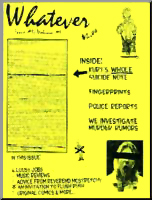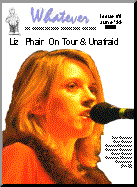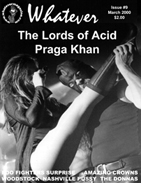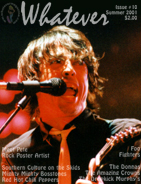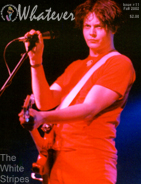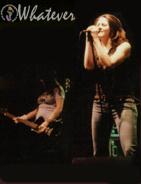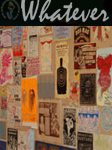Marilyn Manson's "the long road out of hell"
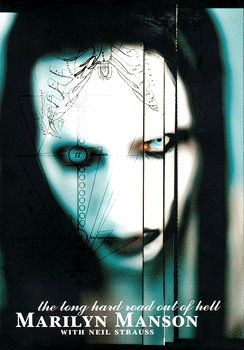 | Marilyn Manson's new autobiography, "The Long Hard Road Out of Hell," chronicles the rise of one of America's most notorious and provocative musicians and provides some insight into the mystique that provokes so many to worship or condemn him. Marilyn Manson's metamorphosis from a "frightened Christian schoolboy" to "All-American Antichrist" is actually much less complicated than the reader might imagine. |
Those unfamiliar with both Marilyn and the band that bears his adopted name will find the tale a bit shocking, but those familiar with his story will be surprised to discover how traditional his life outside of rock and roll has been.
Anybody familiar with today's music scene will also enjoy the names he drops along the way, including details on the relationship between himself and Trent Reznor and tales of the requisite Courtney Love encounters.
The book begins with a young Manson, then known as Brian Warner, living a fairly normal childhood in Canton, Ohio with the exception of yearly physicals resulting from his father's exposure to Agent Orange in Vietnam. Brian attended Christian school, and often visited with his paternal grandparents. emerge through his expressed fear and hatred of Christian dogma and in the discovery of his grandfather's secret life in a basement populated by graphic pornography, sexual devices, lingerie, and the other associated trappings of a sick and repressed man.
Brian struggles throughout his teen years with feelings of insecurity, frustration, anger, and an inability to fit in with most of his classmates, even after successfully transferring to a public school. Music provides an escape from Brian's problems. Heavy Metal bands like Kiss, Iron Maiden, and Judas Priest, singing songs about partying, women, and breaking the law, were a naturally appealing to the disgruntled former Catholic student. His father even takes him to a Kiss concert in full Gene Simm on's makeup in a rare attempt to bond.
His desire to escape his family soon grows stronger than his need to bond with them, so he befriends some drug-using youths who introduce him to what would eventually become Marilyn's trademark, Satanism. The brother of one of his friends, John, is a practicing pot head and Satanic Priest. The combination intrigues the impressionable Brain Warner, but scares him more. Eventually he and his friend buddy up with the older brother, but the closest they get to a satanic ritual is drinking Southern Comfort from a water pipe.
Eventually Brian moves to Florida with his family, who he hates for taking him away from his "friends." A gruesome short story and some adolescent poetry written by Brain are included in the book, as well as the correspondence he accumulated in his a ttempts to get the story published. He is rejected but ends up writing concert reviews in college.
Eventually he turns to open mic nights to have his poetry heard, which evolved through performance art before settling on music. He adopts the moniker Marilyn (for Marilyn Monroe) Manson (for Charles Manson) because "I wanted to be the loudest, most persistent alarm clock I could be, because there didn't seem like any other way to snap society out of its Christianity- and media-induced coma."
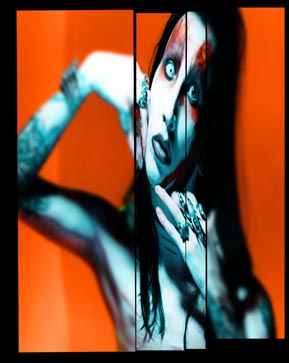 |
The details of the early days of Marilyn Manson [the band] are conveyed through a reprint of a long interview done for Empyrean Magazine, photos, and copies of the old flyers Mr. Manson himself drew to advertise the band's shows. Stories of early ban d members and their torrid demises are also told. Marilyn reveals only what he wants to and time gaps seem to accumulate as the story progresses. While the band recorded their third CD "Antichrist Superstar," Marilyn believes he is becoming the Antichrist Superstar. |
Drugs play a big part of the story throughout this section, but Manson is honestly ashamed and horrified by many of the experiences, and in the end he must quit doing them to record the "Superstar" material competently. The album grabbed attention and provoked protests at his concerts. Instead of giving a full account of the tour he relates this through a tour diary that features impressions of his hatred of Americans as well as his feelings about his growing stardom.
"Antichrist Superstar" chronicles the story a "Wormboy" as he grows and captivates the world he wants to destroy. [The book is divided into three chapters; the first of which is titled, "when I was a worm."] It tells tales of horror and love, pleasure and oppression, fear and sex. Performing the material on 1997's "Dead to the World" tour caused controversy all over the country, including local shows in Providence and Fitchburg. A flyer distributed at the concert by the Fitchburg Nights of Columbus is included in the book, though Manson doesn't discuss the hubaloo surrounding these shows.
"The Long Hard Road Out of Hell," didn'’t seem that long, hard or helicial, but it is a surprisingly insightful and compelling success story. A self-educated philosopher, Manson did not set out to be simply a symbol of terror and control. He named him self in honor of Marilyn, a beautiful, deceptively clever personality, capable of publicly exposing evil by indulging in it. The energy of his book seems to indicate he’s only just begun.


